

 |
AfroCubaWeb
|
 |
|
|
Etubom Bassey Ekpo Bassey,
Iyamba of Ekoretonko, on Ekpe and Cuban Culture, English
and Español, 8/06 Etubom Bassey Ekpo Bassey was crowned Obong of Calabar, 4/6/08 |
Visit to the Ekoretonko Lodge, 12/04 |
| Visit to the Obutong Ekpe Lodge, 12/04 | |
|
Response from the Cubans to the statement by
Iyamba Respuesta de los cubanos a esta frase de Iyamba 8/13/06
Continuation of the response to the statement by Iyamba,
5/4/07, by Roman Díaz |
Follow up, 2005
|
Visit to the Ekoretonko Lodge:
The lodge of which Diaz and Sanchez are members - Ekueri Tongo - was derived from the Calabar lodge called Ekoretonko in the 19th century. It so happened that Etubom B.E. Bassey, the Festival founder, is the Iyamba (leader) of the Ekoretonko lodge. As part of this historic encounter, Diaz and Sanchez were invited into the Efe Ekpe Eyo Ema (Ekoretonko) lodge to meet brothers from the homeland lodge.
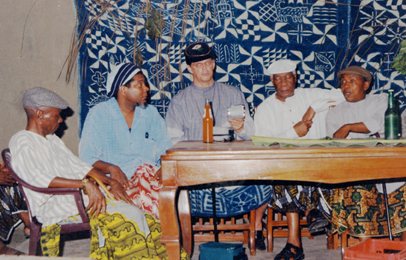
Left to right: Chief Thomas Ekpe Bassey, Roman Diaz, Ivor Miller, Vicente Sanchez, and an Iyamba from Efut in the Efe Ekpe Eyo Ema.
Visit to the Obutong Ekpe Lodge: ![]()
On December 24, Friday we were received by the Obutong lodge (Efe Ekpe Asibong Ekondo), led by Iyamba Eso Asibong Eso. After introductions, Diaz and Sanchez chanted specific phrases for Obutong, since this historical place is prominent in Cuban Abakua history.
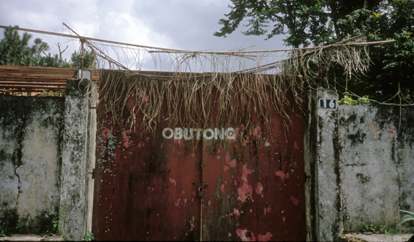

The portal to the Efe Ekpe Asibong Ekondo, Obutong
Below: inside the Obutong Lodge. The Title Holders sit at the head table. Third from left is the Iyamba -- Eso Archibong Eso.
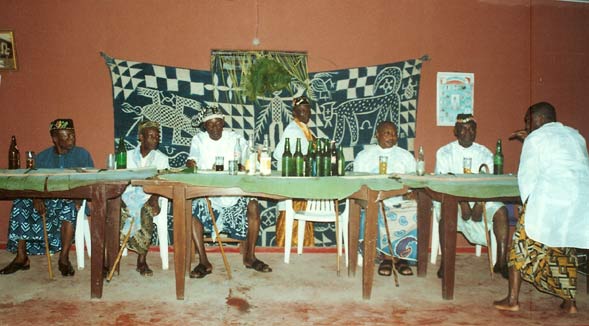
After Diaz and Sanchez returned the New York on December 26, Miller continued research throughout the Cross River region. For example, attending a meeting at the Efut Assembly Palace in Calabar South, where Efuts, Ejagham, and some Efiks met to discussion mutual concerns.
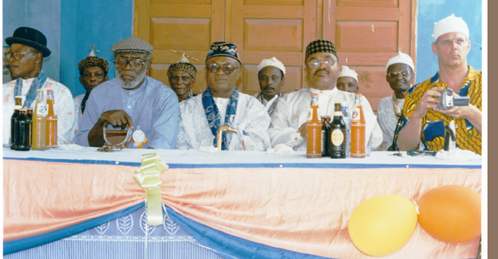
Title holders sit at the high table at the Efut Assembly, Calabar South. Miller at right.
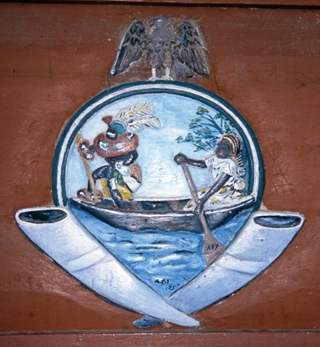
Detail of the insignia on the door of the Efut Assembly, evoking the presence of Ekpe.
Plans are in the making to have Cuban Abakua participation at the next annual Ekpe Festival.
April 2005, by Dr. Ivor Miller
To return to the start of this article:
All photos copyright 2004 by Mr. Mpkan Ekpe Bassey, Ekpe member, Calabar
See also our Abakua page.
Etubom Bassey Ekpo Bassey, Iyamba of Ekoretonko, on Ekpe Culture, English and Spanish, 8/06
|
Etubom Bassey Ekpo Bassey, Iyamba of Ekoretonko (Efe Ekpe Eyo Ema), Calabar, speaking to a tourism bureau in Nigeria, explaining the importance of Ekpe as the basis of Cross River civilization, and the of the connection to the Abakuá of Cuba. (February 2005). “The aspect of Ekpe that concerns me, is the culture. Because as a people we need self identity. Black people in the Americas and Europe understand this much more than we do. Because people look at them as not having a form of identity not coming from anywhere, except from the bush. So when they see a cultural form like Ekpe, they tend to cling to it, because it is self identity for them; it is also proof that they did not come from the bush. Because Ekpe is a very high cultural form; it is religious, it embodies traditional philosophy, there are colorful celebratory aspects. So for them, Ekpe is proof that they had their own civilization. The first form of writing in sub-Saharan Africa is Nsibidi, which came from Ekpe. A lot of the calligraphy is lost now, but it's in the libraries of Europe and America. It's just a few signs that have survived in our ukara cloth and our inner temples. But all these things point to the fact that we have our own civilization, and as you study civilizations in Egypt, China, Mesopotamia, Greek, etc., we also have our own civilization to study, and all that is embodied in Ekpe. So when you throw that away, under the onslaught of Christianity, what do you have left?” What is it that points to the fact that you are not just a nobody? That you have roots which are comparable to the roots of other peoples: white people, yellow people, and so forth. What is it that you have? Because they look at Black people in the Americas, who answer to English names, they practice European religion (Christianity), they wear European clothes. So they have no form of identity and no self-respect. So when you see the Cubans, who over 200 years have clung onto this Ekpe cultural form, and practiced it and deepened it, their hearts will bleed, if they come back here and see that Christianity has wiped it out from the base, that it doesn't exist here anymore. As a matter of fact, people can then look at what they are presenting in Cuba as a fake! As something which has no origins. I ask: “why are black people so different? The British were everywhere, but they were only able to plant their religion among black people. They were in India, but the Indians are still practicing the religions they had before the British came. Why is it that it is black people that have this consciousness, that it is inferior if it is African? It is superior if it is European? Which is why decolonization was so difficult in Africa, because of the enslavement of our consciousness. Christianity itself has so many traditions built into it. Easter is an Anglo-Saxon divinity for the cult of fertility, named after the goddess Easter. And the symbol of that goddess is an Egg. . . . Why is it that other peoples have placed a condition upon Christianity, that is: “you must take our tradition into your worship before we can come along with you,” but when it comes here, we use it even to destroy our own traditions so that Christianity can survive? Christianity has survived, it doesn't need to destroy our tradition. . . . As a people, we must have
a culture. There is not greater embodiment of that culture than Ekpe,
which was and is a highly developed cultural form containing religion,
philosophy, that also presented the first form of writing in sub-Saharan
Africa. You are into tourism now. There can be no greater event tourism
than the kind of festival we are planning. Etubom Bassey Ekpo Bassey, Iyamba de Ekoretonko (Efe Ekpe Eyo Ema), Calabar, hablando a un buró de turismo en Nigeria, explicando la importancia de Ekpe como base de su historia, y la conexión con los Abakuá de Cuba. (Febrero 2005). El aspecto que me interesa es la cultura. Porque un pueblo necesita una identidad propia. Los negros en Europa y las Américas entienden esto mucho mejor que nosotros. Porque otros los miran como unos salvajes, sin identidad. Entonces cuando los negros ven una forma cultural como el Ekpe, tienden a abrazarlo como parte de su identidad propia; es también prueba que no salieron de la selva. Porque el Ekpe es una forma de cultura muy elevada; es religioso, incluye filosofía tradicional, y tiene ceremonias diversas y coloridas. Para ellos, Ekpe es prueba que tenían su propia civilización. La primera manera de comunicación (incluyendo escribir) en el África sub-sahariana es Nsidibi (que se manifiesta a través de los trazos, danza, tambores y gestos), que surgió de la cultura de Ekpe. Muchos de sus trazos están perdidos, aunque documentados en las bibliotecas de Europa y las Américas. Algunos símbolos se mantiene en nuestra cultura que se practica en nuestros templos. Nosotros tenemos nuestra civilización, como tenían los Egipcios, Chinos, Mesopotámicos, Griegos, etc., y nuestra civilización esta encarnada en el ekpe. Entonces cuando nosotros lo apartamos bajo la influencia del Cristianismo, ¿qué nos quedará? Esto indica que no eres nadie, que no tiene raíces con los otros pueblos. Una prueba de esto son los negros de las Américas, que responden a la cultura europea: se visten como los europeos, responden a nombres europeos, y practican religión Europea. No tienen un identidad propia ni auto-respecto. Uno ve en los Cubanos, que por mas de 200 años han practicado la cultura de Ekpe, y que si vieran lo que esta sucediendo en estos momentos en África, sus corazones se romperían, al ver que el cristianismo se haya expandido a través de África, y la cultura Ekpe se haya ido desapareciendo. Si desapareciera nuestra cultura de Ekpe, el mundo vería los cubanos como unos farsantes. Yo me pregunto: “por qué somos los negros diferente? Porque otras culturas no han perdido su identidad a pesar del dominio del colonialismo, por ejemplo en la India, donde siguen practicando la religión que tenían antes de la llegada de los Ingleses. ¿Porqué son los negros que tienen ese complejo de inferioridad? Por eso la descolonización ha sido tan difícil en el África, por la esclavitud de nuestras mentes. El cristianismo celebra y mantiene muchas tradiciones, como la pascua, que es una divinidad Ango-Saxajón. . . Porque nuestros pueblos no han logrado ínter lazar sus tradiciones con el cristianismo? Porqué nuestros hermanos han utilizado el cristianismo para destruir nuestros origines? El cristianismo ha sobrevivido, no necesita destruir nuestra cultura. No hay pueblo sin cultura. En nuestra cultura, Ekpe es nuestra divinidad, y la forma mas desarrollada de religión, filosofía, y comunicación. Ustedes que están manejando el turismo deben reconocer que no pueden tener un gran evento de turismo cultural sin la participación del Ekpe. |
|
Response from the Cubans to the statement by Iyamba: “A legendary african of Calabarí origin / went to live in Núnkue [Cuba] / under the yoke of slavery / where they tried in vain to humiliate him into forgetting Tacho, Natachao, Naberetacho. Itia koronbán awana bekura mendo. [ancestral powers on the coast of West Africa]. They tried to make him forget the knowledge of Nandibá, in the territory of Usagaré [i.e., Isangele, Usak-Edet] / but it was impossible, as impossible it is for modern man to live without Ebión Ndayo [the sun]. Erendió Abasi Bome, thanks to God Almighty for the great vision of Andrés Kimbisa, Isué of Bakokó.” Roman Díaz, Moní Bonkó de Ekueritonkó, La Habana. |
Respuesta de los cubanos a esta frase de Iyamba: “Un legendario africano de origen carabali / a núnkue se fue a vivir / del yugo encadenado / allí trataron en vano humillarlo a desistir de Tacho, Natachao, Naberetacho. Itia koronbán awana bekura mendo. Desviarlo del cause que trazó nandibá, en territorio Usagaré, pero fue imposible, como imposible es y será para el hombre moderno vivir sin ebión endayo. Erendió abasi bome, a la gran visión de Andrés Kimbisa, Isué de Bakoko.” Roman Díaz, Moní Bonkó de Ekueritonkó, La Habana.
|
| “An Example of Faith” The time of slavery was hard for the legendary Africans, uprooted from their lands and in the majority of cases obligated to practice the belief system of their masters. But they did not abandon their gods, they followed the outline of Nandibá [the sacred river] as they reconstructed their communities. Today modern man seeks solar energy to struggle against pollution, yet the Calabarí always co-existed and will live in harmony with nature; the flora and fauna are their elements. Andrés Petit [a 19th century Cuban Abakuá leader] was a great visionary of this tough era, and some of his propositions remain the object of study by contemporary teachers and intellectuals. His efforts, together with those in literature, music, and dance, contributed to ensure that Calabarí culture would form an important part of the cultural patrimony of the Cuban nation. Andrés Petit worked for the sake of religious co-existence without racial distinctions. He established the lineage Santo Cristo del Buen Viaje, making real the words of Cuban National Poet Nicolas Guillén in the 1930s: “I am Cuban, I am Lukumi, Congo, Mandinga and Calabari”, as well as what the poet ‘El Ambia’ said in the 1990s: “The cause of the crossword, aréré and conscience, I am Orula . . .”, in turn responding to Piñeiro and Vera in the 1920s: “when the bonko sounds, people get excited and the happy public chants Abakua.” In the “key to the Gulf” [Cuba], between the Cayman Islands and Barbados are kept many great tratados [mythic histories] of the Kongo, Yoruba, and Calabarí. To speak of the Caribbean Sea is to include Puerto Rico, Santo Domingo, Haiti, Jamaica, Panama, Venezuela, the State of Florida, New Orleans, and South America. In other words, the entire American continent. Iyamba, it is our hope that your magnificent project of the Ekpe Festivals contributes, as in the past contributed the ideas of Andrés Petit . . . [‘Román’ Díaz is a student of Cuban culture, and does not enter into political matters.] May 11, 2007 |
“Ejemplo de la Fe” Fueron duros los tiempos de la esclavitud para los legendarios africanos, arrancados de sus tierras obligados en la mayoría de los casos a practicar las creencias de sus amos, pero ellos no abandonaron a sus dioses, siguieron el trazo de Nandivá y reconstruyeron sus pueblos. Hoy el hombre moderno busca energía en el sol para luchar contra la contaminación: El Calabarí siempre convivió y vivirá en armonía con la naturaleza; la flora y fauna son sus elementos. Andrés Petit fue un gran visionario de esa dura época, algunas de sus propuestas aun hoy día son objeto de análisis por parte de los maestros e intelectuales estudiosos del tema, pero su grano de arena junto a la literatura, música, y danza, contribuyó a que la cultura calabarí forme parte importante en el patrimonio cultural de la nación cubana. Andrés Petit trabajó en aras de la convivencia religiosa sin distinción de razas, al decir Santo Cristo del Buen Viaje, haciendo reales las palabras del poeta nacional Nicolás Guillén en los 1930s, en una nueva versión: “cubano soy, soy Lukumi, Congo, Mandinga y Calabari,” a lo que dijo ‘El Ambia’ en los 1990s: “La razón del crucigrama, aréré y conciencia, soy Orula . . .”, respondiendo a Piñeiro y Vera en los 1920s: “en cuanto suena el bonko todo el mundo se emociona y el mazo feliz entona los cantares del Abakua.” En “la llave del golfo” entre el Gran Caimán y Barbados, se encuentran grandes tratados Congo, Yoruba, y Calabarí. Al hablar del mar Caribe, se habla de Puerto Rico, Santo Domingo, Haití, Jamaica, Panamá, Venezuela, estado de la Florida y New Orleans, y Suramérica, es decir, todo el continente americano. Iyamba, esperamos que su magnifica idea de los festivales de Ekpe contribuya como antaño contribuyeron las ideas de Andrés Petit . . . [‘Román’ Díaz es un estudioso de la cultura cubana y no entra en asuntos políticos.] May 10, 2007 |
[AfroCubaWeb] [Site Map] [Music] [Arts] [Authors] [News] [Search this site]